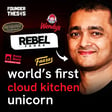
Upending the age-old business of Clubs | Vivek Narain@ The Quorum
For a lot of people, hospitality is their ultimate entrepreneurship dream, and they aspire to start a restaurant or a cafe and quit their stressful corporate world career.
In this episode of the Founder Thesis podcast - we speak to a hospitality founder who has built and scaled a truly unique hospitality business and given a new age avatar to a very old business.
Most of you would be aware of the concept of clubs. Iconic clubs like the Gymkhana club in Delhi have a membership wait time that is measured in decades!!!
Vivek saw that there is a massive gap between such old-world clubs and the young India which also aspired for a third place where they can belong to a community, work, experience culture or just unwind. And that is the space that The Quorum club is filling.
In this fascinating conversation, Vivek explains what this industry looks like, the business model of Clubs, and the playbook of scaling a very heavily service oriented business.
Stay tuned to get a peek into the fascinating world of clubs and subscribe to the Founder Thesis podcast for more such sector specific deep dives.



















